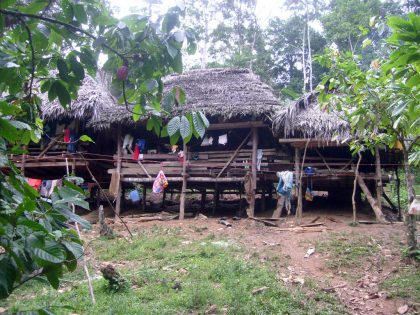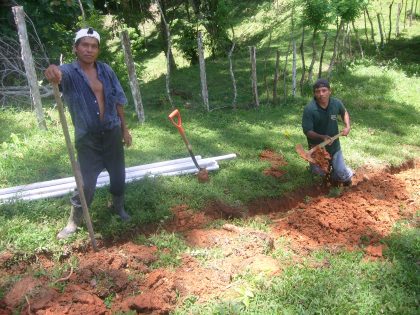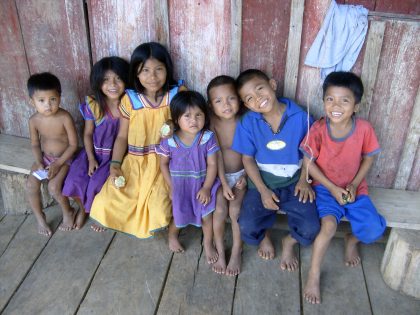 Location
Location
Quebrada Banano, Bocas del Toro Province, Republic of Panama
Community Description
Quebrada Banano is a rural indigenous village of about 225 situated in the rolling hills between the Changuinola-Almirante highway and the old banana company railroad. Nearly all the residents are subsistence farmers, selling cacao for cash and growing plantains, peach palm and tubers for their own consumption. All of the residents live below the poverty line.
The houses are spaced far apart, which has posed logistical problems for the construction of an aqueduct. Half of the community receives water from an aqueduct constructed in 2006 by the Ministry of Health. However, the rest of the community lies beyond the reach of the MINSA aqueduct.
In 2008, PCV Nico Armstrong took over the aqueduct project initiated by PCV Julie Majkrzak, and, along with the community, buried 1.5 miles of tubing, reinforced the spring box with concrete, and installed a 600-gallon tank.
However, the project did not have enough funds to purchase the last 100 tubes necessary to reach the community. Currently, the aqueduct provides water to only one household.
The main community counterparts are the members of the water committee and the regidor. Of the six water committee members, 2 women and 4 men, 5 regularly attended a twelve-week seminar on water resource management, organized and directed by PCV Majkrzak, who previously resided in Quebrada Banano. The course included components of aqueduct repair, accountability and transparency in managing water committee funds, leadership and dynamic icebreakers, and how to sanitize contaminated water.
The committee has put some of the theory into practice since then. The water committee currently charges $1 monthly to every household that uses the water, including the one house that is currently connected to the incomplete aqueduct.
In December of 2008, the community demonstrated their commitment to maintaining their aqueduct by repairing extensive damages caused by severe flooding and landslides during that month.
The water project is a community priority mainly for health reasons. Half of the community’s residents who do not receive water from the Ministry of Health aqueduct either drink from contaminated streams or send their children on a long trek to fill buckets from the MINSA aqueduct tap.
 Project Description
Project Description
This project is a continuation of another project that failed to meet its goals because of a lack of necessary funds. Currently, only 100 tubes separate the water tank from the community below. However, the community does not have the resources to purchase the lacking materials.
The project funds will be used to buy pipes and faucets. In addition, cement will be purchased to shore up the spring box against landslides. Also, the barbed wire will be purchased to make “bridges” to support the tubing where a stream is crossed and to create a protected area for reforestation.
All of the materials will be purchased in one purchase at Materiales Franklin in
Changuinola. Materiales Franklin will provide free transport, and the community beneficiaries will carry the materials down from the main road.
The burying of the pipeline will take 4 working days, to be accomplished in two weeks. The men (anywhere between 7 and 11 at a time) will place and bury the pipes and build the bridges. The women will cook food for the workers.
This project will be accompanied by a workshop hosted by the PCVs Nico
Armstrong and Myles Shuler on how to build a nursery and care for tree saplings. The beneficiaries will sign a form committing each household to plant 10 trees and make a small nursery.
This project will be followed up by the construction of a fence around the watershed and the planting of 90 trees, 10 for each family, harvested from local seeds and prepared in household nurseries.
 Project Impact
Project Impact
This project will provide clean water for 102 people, comprised of 53 adults and 49 children, in 9 separate households.
Peace Corps Volunteer Directing Project
Nico Armstrong
Comments
This project, first and foremost, shows the importance of an element of our model, which is to “complete” projects that are otherwise non-functioning. The project sat idle while people did not have access to safe water, because of a shortfall of a relatively small amount of money.
The project provides additional resources to an active local organization that has been trained in the technology. It is being carried out by a community committed to doing everything necessary to obtain safe water. The project is accompanied by an educational workshop, and will be followed by additional work to improve the health and well-being of the participants. These elements assure the sustainability of the project.
Dollar Amount of Project
$438.00
Donations Collected to Date
$438.00
Dollar Amount Needed
$0.00 – This project has been fully funded, through the generosity of The Soneva SLOW LIFE Trust as a part of their Clean Water Projects initiative.
We encourage others to continue to donate using the Donate button below, and we will notify Peace Corps Volunteer Nico Armstrong of your donation. Additional funds will be used to fund the next project by Nico and/or those of his counterpart PCVs in Panama.
![]()
This project has been completed. To read about the conclusion of this project, CLICK HERE.